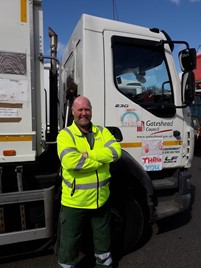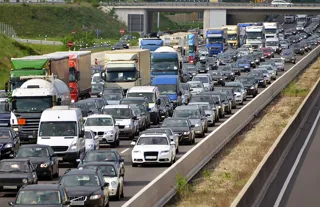 This article originally appeared in the May issue of Fleet News availavle as a digital edition.
This article originally appeared in the May issue of Fleet News availavle as a digital edition.
Graham Telfer, Gateshead Council fleet manager, has made sure vital services for his borough in Tyne and Wear are maintained, even with the odds stacked against his teams due to social distancing. As told to Tom Seymour.
7.30M: Start work at head office
I’ll start the day checking emails and making contact with the teams and review all the vehicles going out on their jobs across the borough. I have to be here centrally so I’m available if something goes wrong as we have to respond quickly.
Part of my job is making sure we can maintain services across refuse, garden waste, residual waste, recycling, grounds maintenance, cemetery undertakings and community-based services.
We have 35 26-tonne refuse vehicles in use and there has been a real challenge with how we operate them on a daily basis due to the fact they usually run with crews of three to four in a single vehicle. It’s impossible to adhere to social distancing of two metres in that situation, so we’ve had to put together a support fleet with the two team members following the main refuse truck in separate vans. They’ll park up and then follow the route for a certain area on foot, then head back to their vans to follow the truck to the next zone.
9am: Check deliveries for school meals
We’re not just using our light commercial vehicle (LCV) fleet to support the refuse teams, but also to help support schools to deliver packed lunches for those children of key workers and to make drops at food banks.
None of the schools can prep their own food on site at this time, so I will make sure our fleet is available to get deliveries out before lunch. That can be a real challenge. All the schools want the meals before the dinner bell rings.
We have a fleet of 300 vans across the council and what is available has been bolstered by vehicles that would normally be used for joinery or plumbing becoming freed-up. Those jobs have stopped or reduced. We’re also using these vehicles to help distribute personal protective equipment (PPE) to those who need it. We have an additional flex of 40 small vans through our supplier Northgate Vehicle Hire to provide additional capacity where we need it. We have a total of 200 drivers working across vehicles to keep services running smoothly.
10am: Check in with the workshop teams
The original set-up for maintenance of vehicles has changed hugely. We have one, centralised depot for maintenance, but to maintain safe distances we’re working to a 50% team reduction in shifts, so across the total team of 35, we’ll have a team of 10 one week on, then the week after another team of 10 will come in.
There’s some scope built in for eight or nine people to be off self-isolating if they or members of their family have symptoms. We’re having to run things this way because we can’t afford to have the entire team off and self-isolating as this would severely impact our capacity to maintain vehicles and keep vehicles on the road. We are deep cleaning vehicles every day with heavy duty disinfectant to give drivers some level of confidence and to support them in their role.
Noon: Look at maintenance schedule
We can’t afford to let routine maintenance lapse so we’re carrying on with all MOTs and servicing as we would normally. I don’t want to be in a position where we’re coming out of this and we have the entire fleet due for a service and MOT.
We’re getting ourselves into a pattern, so we don’t find ourselves over encumbered and the scheduling has been thrown into disarray. Manufacturers’ parts have generally been able to keep to next-day delivery.
2pm: Industry updates
Guidance from the Department of Transport has been really clear and there have been regular updates coming through. So, that is part of my daily routine. I’ll also check with the Freight Transport Association (FTA) and Driving for Better Business Covid-19 transport toolkit as that has been a good resource for guidance and keeping up-to-date. Every two or three days something changes.
5pm: Video conferencing
We’ve been checking in across the management teams using video conferencing every other day to update the latest on what’s happening. I’ll also do a workshop meeting face-to-face every day while maintaining the two-metre social distancing.
10pm: Final email check
While I’ll leave the office at around 5pm, I’ll still be checking emails in the evening to make sure there have been no urgent developments we need to be prepared for the following day.
The NHS and local authorities have stood up to the test. Instead of bouncing off the walls, we have successfully kept the lights on for the country and it has been a lesson in how to knuckle down and get on with what needs to be done.
Frontline fleets: Case studies
Tony Robinson, refuse collection driver at Gateshead Council 
The lockdown has created new challenges for Gateshead Council’s refuse collection team as they maintain social distancing in a work environment that would normally see close contact between crews.
Tony Robinson, Gateshead refuse collection driver, said his shift is still starting at around 7.15am with the usual vehicle checks, before they set out on their rounds at 7.30am.
They would normally operate with a three-man crew in the truck, but now Robinson will drive solo and other members of the team will follow in separate vans to maintain social distancing.
Vehicles are deep cleaned before the start of the shift and there is a ‘plentiful supply’ of latex gloves, extra rolls of blue paper and sanitiser wipes to clean things down.
Robinson said: “I’m wiping down the cab, steering wheel and handles on an hourly basis.
“The fact we’re handling potentially hazardous items from people’s houses that could be contaminated with Covid-19 is not lost on us or the teams, so we take this extremely seriously. It’s at the back of my mind when I’m working.”
The biggest change to Robinson’s job has been the fact there are more parked vehicles due to the lockdown which has made it more difficult to manoeuvre his 26-tonne truck.
The flipside of that is a fall in traffic congestion in the morning, so the crews can travel to their jobs slightly quicker than usual.
Robinson said: “Our shifts can take us an extra two hours on average due to the extra time it’s taking due to the much greater volumes of refuse. People staying at home has meant there has been a lot of spring cleaning and clearing out of houses. There’s just a lot more refuse for us to collect.”
You can read the article in the May issue of Fleet News, by clicking here
Keep up to date with Covid-19 news and guidance
For the latest commercial fleet guidance on Covid-19, click here
For the latest commercial fleet-specific Covid-19 news, click here
The FTA and CILT have launched a coronavirus good practice guide, access it here



















Login to comment
Comments
No comments have been made yet.